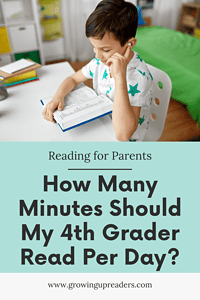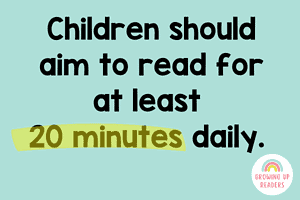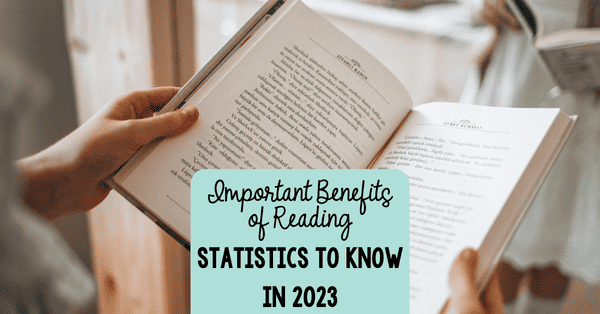This post examines how many minutes a 4th grader should read per day.
how many minutes should a 4th grader read Per Day?
If your child is 9 or 10 years old, you may be wondering how much they should read each day. It’s important to know that reading every day is valuable.
There are just so many benefits to daily reading! Not only does daily reading practice lead to better vocabulary but it also improves language skills. Given these amazing benefits of reading, it’s important to encourage your 4th grader to keep on reading.

In this post, I am excited to share some research-backed recommendations with you. I’m also sharing some great tips and tricks to keep your fourth grader interested and engaged in books.
Overall, the current research recommends that children read for at least 20 minutes per day.

Recommended Reading Time for 4th Graders
Establishing a regular reading routine is important for 4th graders. Aim for at least 20 minutes of reading per day. That’s the amount of time that experts recommend.
Having regular reading time in your daily routine allows your child to immerse themselves into the wonderful world of books. They will be able to reap the amazing benefits of independent reading as well.
Let’s talk more about the benefits of daily reading.

The Benefits of Daily Reading
Daily reading has a variety of benefits for children of all ages. Beyond the absolute fun of getting lost in a captivating story, regular reading enhances vocabulary, boosts comprehension skills, increases critical thinking skills, improves academic performance, and has the potential to nurture empathy and social awareness.
Let’s talk more about these amazing advantages below.
Vocabulary Building and Language Skills
Reading every day provides some important benefits to fourth graders, such as improving their vocabulary and language skills. While kids are reading, they come across so many new words and phrases that help them learn and understand the language better.
When they find new words in different situations, they not only learn what the words mean but also how to use the word correctly. When they learn these new vocabulary words, they’ll have a larger collection of words to use when they are speaking or writing. (Writing skills will get better, too!)
Children are exposed not only to new words while reading, but they are also exposed to different writing styles and types of books. Because of this exposure, kids become better at using language effectively and creatively to communicate.
Enhanced Comprehension and Critical Thinking
Reading books every day is fantastic for fourth graders because it leads to better comprehension and critical thinking skills. When kids read different types of books, they become better at understanding new information.
While they are reading, they are figuring out all of these different parts of reading – finding the main idea, making connections, drawing conclusions, and so much more. Many times, they don’t even realize they are doing such complex things!
By reading books that have different writing styles and unique perspectives, child are developing their critical thinking abilities. Think of critical thinking as your ability to analyze information, ask questions, and form opinions of your own.
The more they read, the more skilled they become at figuring out complex ideas, making informed decisions, and expressing themselves with confidence.
Academic Performance
Regular reading has a big impact on the academic performance of 4th graders. Research consistently shows that reading every day is closely connected to doing well in school.
When kids make reading a daily habit, it helps them improve their reading comprehension, vocabulary, and fluency, which are really important skills for all subjects they study.
They are also exposed to different topics, which helps them build a wide range of knowledge that can be useful in different school subjects.
When fourth graders read every day, they often do better on tests, assignments, and just overall in their school work. In general, student achievement increases.
Empathy and Social Awareness
Daily reading helps 4th graders become more empathetic and socially aware. When kids read books, they encounter characters from various backgrounds, cultures, and points of view. This lets them see how life is lived by different people. It helps them understand and care about others.
By immersing themselves in these stories, they develop empathy, compassion, and a greater understanding of people’s feelings. Reading about characters who face challenges, overcome obstacles, or navigate complex relationships also helps them become more socially aware.
It encourages them to consider different perspectives and think about how others may feel in certain situations. These skills go beyond just reading—they shape how they interact with others, handle social situations, and contribute to a more inclusive and caring society.
Reading to Your Child Matters, too!
In addition to independent reading time, the significance of reading to your child cannot be overstated. This section explores the benefits of shared reading experiences and the profound impact they have on your child’s literacy development.

Exposure to Complex Texts
When you read to them, you get to introduce them to literature that might be a bit tougher for them to read on their own. It’s like opening a door to a whole new world of words, sentence structures, and different storytelling techniques.When you are reading out loud to them, you can definitely go beyond children’s books.
By exposing them to these more advanced things, you actually help them understand the language better and grasp literary concepts.
And here’s another great part: complex texts really challenge their brains! They make them think critically, make connections between ideas, and analyze information in a deeper way.
This kind of exposure actually gets them ready for those harder books they’ll encounter in the future and prepares them for the higher academic stuff. Plus, it expands their literary horizons and plants a seed for a lifelong love of reading challenging and thought-provoking books.
Creating a Love of Books and Storytelling
Reading to your child provides a special chance to create a love for books and storytelling that will stay with them forever. Plus, you’ll be able to spend some quality time together.
When you share those amazing stories, it’s like opening a door to a whole universe of imagination and wonder. They get to go on incredible adventures and explore new worlds right from home!
But here’s the best part: by making reading a fun and positive experience, you’re showing them that books are a source of joy and inspiration. This love for books becomes a habit that lasts a lifetime. It helps them find what they’re truly interested in, broadens their horizons, and encourages them to keep learning even outside of school.
By nurturing this love for books, you’re giving them a lifelong friend and a ticket to endless possibilities. They will have a great time discovering these new books.
Build Listening Skills
Reading aloud to your child not only improves reading skills. It also helps them develop important listening skills.
Let me explain how that works. When you read to them, they pay close attention to the story as it progresses. This actually strengthens their ability to focus, concentrate, and follow along with what’s happening.
Here’s a great benefit for bettering listening skills – they become better at understanding and remembering information.
By actively listening to your voice, they also get familiar with things like how you change your tone, your reading speed, and the emotions you put into it. This actually helps them understand the story even better.
These listening skills they develop go beyond just reading—they become so useful in many other parts of their lives, like school, conversations, and extracurriculars.

Build Reading Fluency
Reading aloud to your child plays a role in building their reading fluency. Reading fluency is your ability to read a text correctly with the appropriate speed and expression. It’s essentially your ability to read something smoothly and naturally.
When your child listens to you read with clarity and expression, they start getting a feel for how language naturally flows and sounds. It’s like they’re learning the rhythm of words.
This exposure to your own fluent reading helps them develop their own reading fluency over time. In this case, you are modeling what reading should sound like.
By reading aloud together, they gain more confidence in their ability to read fluently. When their fluency improves, they start enjoying their reading even more, and understanding what they read becomes easier.
Encouraging Reading At Home
As parents, you have a huge role in helping your child maintain their reading time. If you have a reluctant reader at home, let’s talk about some of the following tips and tricks.
Be a Reading Role Model
When your child sees you reading, you are becoming a reading role model. This is such a great way to encourage a love of books in your child.
Show your enthusiasm and love of books by reading around your child. Discuss the interesting things that are happening in your books. Visit the library or bookstore together and make reading a fun family activity. You want to make sure they build a positive relationship with books.
Set a Regular Reading Time
Reading should be a part of your daily routine. Life gets busy so don’t worry if it’s missed some days! It should still be a priority in your home.
Set aside a specific block of time where the whole family can get together and read. Having regular reading time shows that reading is a valued activity for your home.
Expose Your Child to Different Types of Books
4th grade is a fun age to try a different type of book. In the classroom, they are exposed to a variety of texts! They are starting to read more nonfiction and historical fiction books. This is because they are starting that transition from “learning to read” to “reading to learn.”
If your child is showing interest in these types of books, definitely consider adding them to your library or bookstore wish list. Don’t force it though! If your children are showing interest in other books, follow their lead.
Give your child the chance to choose books that they like. If they seem to really like a certain type of main character, ask your librarian for similar books. Having a range of options helps your child become excited about these different books.
Make Time for Book Discussions
While your child is reading, encourage them to ask questions and share their thoughts. Just sharing personal insights into a story can create a supportive and interactive environment.
By having these discussions, children develop critical thinking skills, gain a deeper understanding of the content, and will learn some new words. They’re also able to build connections to the text they’re reading.
Looking for examples of questions to ask while your child is reading? Check out our post on Questions to Ask While Reading Together.
Factors to Consider for 4th-Grade Students
With these recommendations, it is important to consider the needs of each child. Each child has unique abilities, attention spans, and interests.
As a parent, you are the expert on your child! Feel free to adjust the recommended reading time base on these factors to make sure reading is a fun and enjoyable experience. We don’t want reading to be a chore.
Adjust Reading Time Based on Abilities and Attention Span
Some children may need to read for shorter amounts of time. They should still aim to read for 20-30 minutes per day. However, they may need to take more frequent breaks while other children can sustain longer periods of focused reading.
Watch your child’s reading stamina and adjust the reading time accordingly.
Tailor Support and Motivation Tools as Needed
While your child is reading, be available to offer support and guidance as needed. They may need help with difficult words or concepts that may be new to them.
RELATED POSTS
Important Statistics About Reading Benefits to Know









